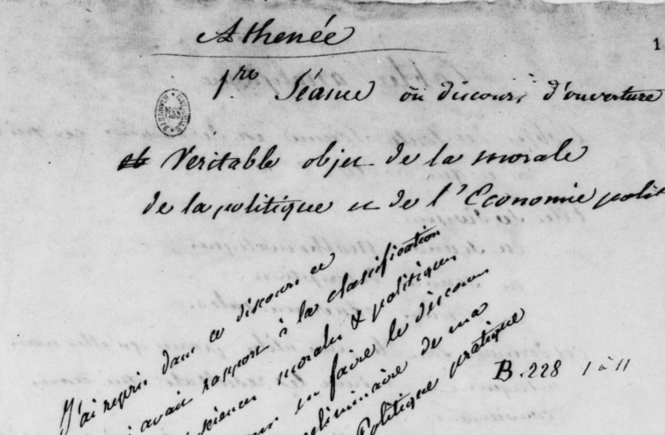Government is not an essential part of the organization of societies. I would ask you to note that I am not saying that government is useless; I say that it is not essential; that society can exist without it; and that if the associates were willing to do their business and to let me do mine, the society might as well function without government. Public authority is therefore an accident; it is an accident made necessary by our imprudence, by our injustice which leads us to infringe on the rights of our fellow man.
Jean-Baptiste Say, Introduction to the Treatise on Political Economy (1803)
A SCIENCE only advances with certainty, when the plan of inquiry and the object of our researches have been clearly defined; otherwise a small number of truths are loosely laid hold of, without their connexion being perceived, and numerous errors, without being enabled to detect their fallacy.
For a long time the science of politics, in strictness limited to the investigation of the principles which lay the foundation of the social order, was confounded with political economy, which unfolds the manner in which wealth is produced, distributed, and consumed. Wealth, nevertheless, is essentially independent of political organization. Under every form of government, a state, whose affairs are well administered, may prosper. Nations have risen to opulence under absolute monarchs, and have been ruined by popular councils. If political liberty is more favourable to the development of wealth, it is indirectly, in the same manner that it is more favourable to general education.
Material on the French school of political economy
Pierre de Boisguilbert (1646-1714) Hazel Van Dyke Roberts, Boisguilbert: economist of the reign of Louis XIV, New York, Columbia University Press, 1935 “Boisguilbert: An Early French Economist“, 1873, Westminster Review Vauban (1633-1707) A Project for a Royal Tythe, or General Tax, which by suppressing all the ancient funds and later projects for raising the public revenues, and for ever abolishing all exemptions, unequal assessments, and all rigours and oppressive distraining of people, will furnish the government a fixt and certain revenue, sufficient for all its exigencies and occasions, without oppressing the subjects, London, 1708 (see also the 1710 edition) Richard […]

